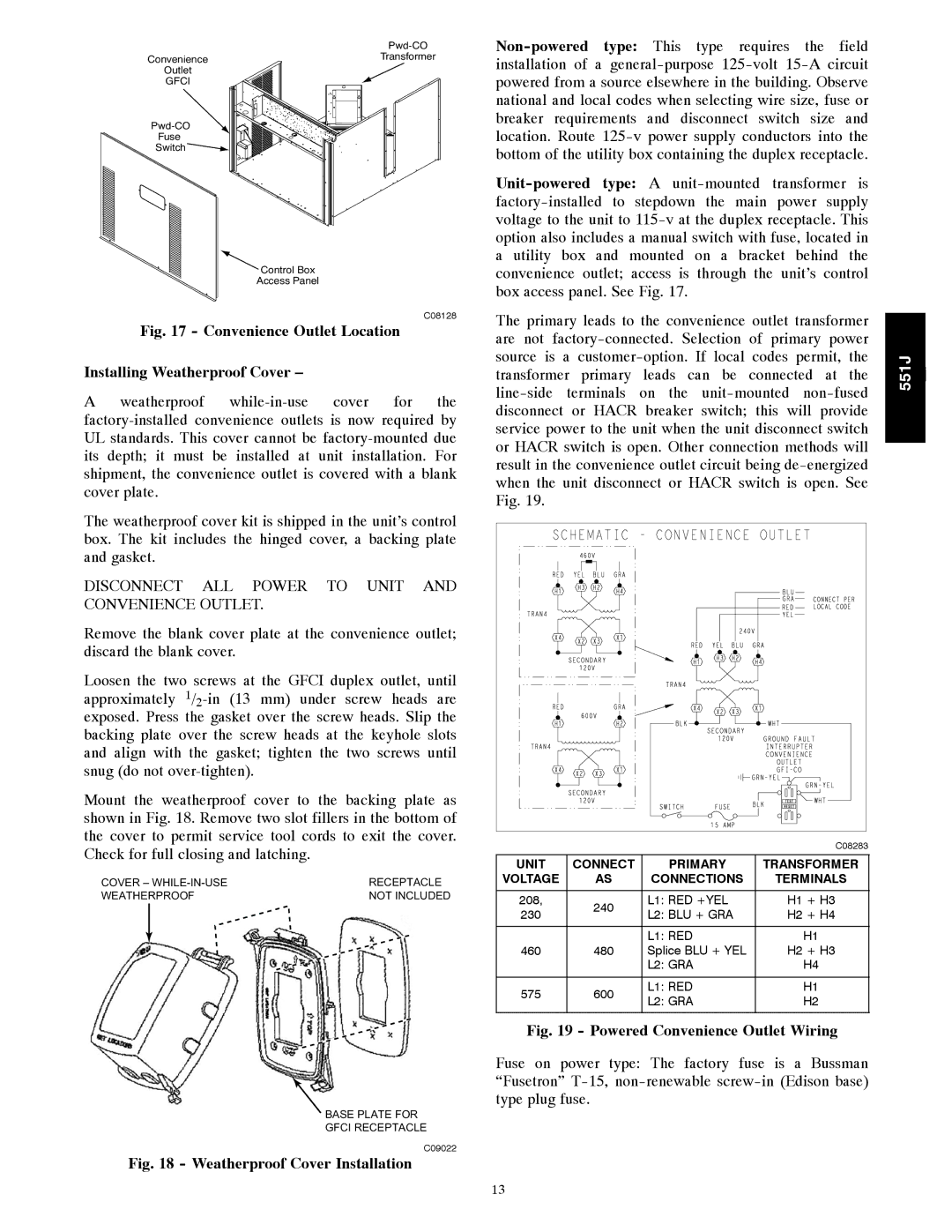| Pwd-CO |
Convenience | Transformer |
Outlet | |
GFCI | |
Pwd-CO
Fuse
Switch 
 Control Box
Control Box
Access Panel
C08128
Fig. 17 - Convenience Outlet Location
Installing Weatherproof Cover –
Aweatherproof while-in-use cover for the factory-installed convenience outlets is now required by UL standards. This cover cannot be factory-mounted due its depth; it must be installed at unit installation. For shipment, the convenience outlet is covered with a blank cover plate.
The weatherproof cover kit is shipped in the unit’s control box. The kit includes the hinged cover, a backing plate and gasket.
DISCONNECT ALL POWER TO UNIT AND CONVENIENCE OUTLET.
Remove the blank cover plate at the convenience outlet; discard the blank cover.
Loosen the two screws at the GFCI duplex outlet, until approximately 1/2-in (13 mm) under screw heads are exposed. Press the gasket over the screw heads. Slip the backing plate over the screw heads at the keyhole slots and align with the gasket; tighten the two screws until snug (do not over-tighten).
Mount the weatherproof cover to the backing plate as shown in Fig. 18. Remove two slot fillers in the bottom of the cover to permit service tool cords to exit the cover. Check for full closing and latching.
COVER – WHILE-IN-USE | RECEPTACLE |
WEATHERPROOF | NOT INCLUDED |
BASE PLATE FOR
GFCI RECEPTACLE
C09022
Fig. 18 - Weatherproof Cover Installation
Non-powered type: This type requires the field installation of a general-purpose 125-volt 15-A circuit powered from a source elsewhere in the building. Observe national and local codes when selecting wire size, fuse or breaker requirements and disconnect switch size and location. Route 125-v power supply conductors into the bottom of the utility box containing the duplex receptacle.
Unit-powered type: A unit-mounted transformer is factory-installed to stepdown the main power supply voltage to the unit to 115-v at the duplex receptacle. This option also includes a manual switch with fuse, located in a utility box and mounted on a bracket behind the convenience outlet; access is through the unit’s control box access panel. See Fig. 17.
The primary leads to the convenience outlet transformer are not factory-connected. Selection of primary power source is a customer-option. If local codes permit, the transformer primary leads can be connected at the line-side terminals on the unit-mounted non-fused disconnect or HACR breaker switch; this will provide service power to the unit when the unit disconnect switch or HACR switch is open. Other connection methods will result in the convenience outlet circuit being de-energized when the unit disconnect or HACR switch is open. See Fig. 19.
| | | | C08283 |
| UNIT | CONNECT | PRIMARY | TRANSFORMER |
| VOLTAGE | AS | CONNECTIONS | TERMINALS |
| 208, | 240 | L1: RED +YEL | H1 + H3 |
| 230 | L2: BLU + GRA | H2 + H4 |
| |
| | | L1: RED | H1 |
| 460 | 480 | Splice BLU + YEL | H2 + H3 |
| | | L2: GRA | H4 |
| 575 | 600 | L1: RED | H1 |
| L2: GRA | H2 |
| | |
Fig. 19 - Powered Convenience Outlet Wiring
Fuse on power type: The factory fuse is a Bussman “Fusetron” T-15, non-renewable screw-in (Edison base) type plug fuse.

![]()
![]() Control Box
Control Box